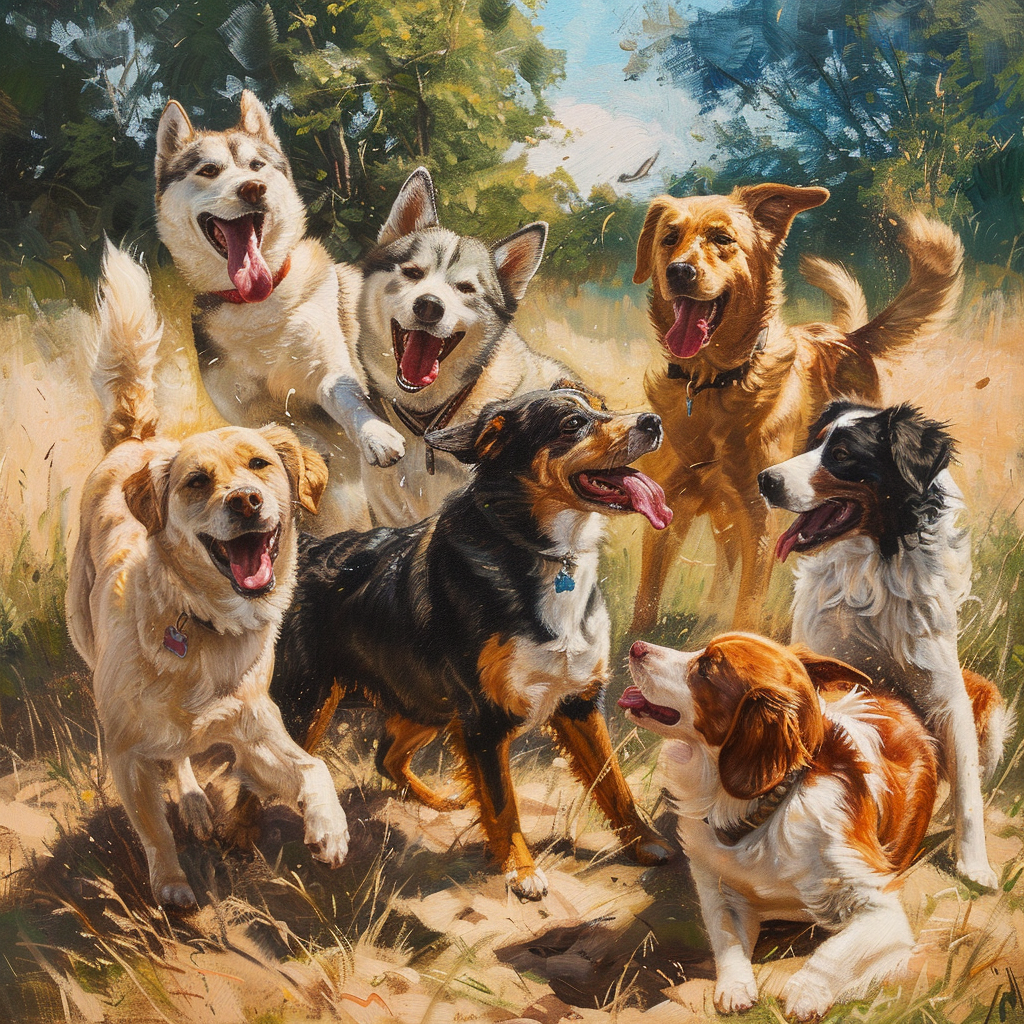Potcake dogs are a unique and fascinating breed that have gained popularity in recent years. These mixed-breed dogs are native to several Caribbean islands, including the Bahamas, and are known for their loyalty, intelligence, and friendly nature.
Despite their popularity, many people are still unfamiliar with this breed and may not realize just how special they are… so let’s learn more about them!

In this article, we’ll explore the history and characteristics of the potcake dog, as well as their health and care needs, behavior and training, and their growing presence in homes around the world.
We’ll also take a look at the cultural impact of these dogs and the advocacy work being done to support them. By the end of this article, you’ll have a better understanding of what makes potcake dogs so special and why they’re worth considering as a companion animal.
Key Takeaways
- Potcake dogs are a mixed-breed dog type found on several Caribbean islands, including the Bahamas.
- They are known for their loyalty, intelligence, and friendly nature.
- Have become increasingly popular in recent years, and are gaining recognition for their unique qualities and the advocacy work being done on their behalf.
Origin and History

Bahamian Roots
We love the Potcake dog breed, and we think you will too! These adorable pups have a rich history that dates back to the Arawak people who inhabited the Caribbean islands long before the arrival of Europeans.
The Arawaks were known for their hunting skills and kept dogs as pets and hunting companions. These dogs were the ancestors of the modern-day Potcake.
The Potcake dog breed has its roots in the Bahamas, where they were originally called the “Bahamian Potcake.” The name “Potcake” comes from the traditional Bahamian dish of the same name, which is made by mixing leftover rice and peas from the bottom of the pot. The dish is a staple in the Bahamas, and the locals would often feed the leftovers to their dogs. Over time, the name “Potcake” became synonymous with the breed.
Caribbean Influence
During the American Revolutionary War, many loyalists fled to the Caribbean islands, bringing their dogs with them. These dogs interbred with the local Potcakes, resulting in a unique mix of breeds. The Potcake dog breed has since spread to other Caribbean islands, where they have become beloved pets.
Breed Characteristics

Appearance
- Potcake dogs are a mixed breed of dogs found on several Caribbean islands.
- They have a long face, smooth coat, and cocked ears.
- Their appearance varies depending on the island and the dog breeds that make up its lineage.
- Come in different colors, including black, brown, and white.
- They have a height of around 14 to 24 inches and can weigh between 30 to 50 pounds.
Temperament
Potcake dogs are known for their friendly and loyal temperament. They are intelligent and adaptable, making them great pets for families with children.
They are also territorial and interactive, which makes them great watchdogs. They are calm and have a charming personality that makes them a favorite among dog enthusiasts and pet owners alike.
Potcake dogs have a lot of energy and require regular exercise to stay healthy. They are also trainable, making them great candidates for obedience training. These breeds have a lifespan of around 10 to 14 years and are generally healthy dogs.
Health and Care

At first glance, Potcake dogs may seem like low-maintenance dogs, but they still require proper care to ensure they stay healthy and happy. In this section, we will discuss some of the common health issues and grooming needs of Potcake dogs.
Common Health Issues
Potcake dogs are generally healthy, but like all dogs, they are still susceptible to certain health issues. Some of their most common health issues include heartworm, allergies, and ticks.
Heartworm is a serious condition that can be fatal if left untreated. It is caused by a parasitic worm that is transmitted through the bite of an infected mosquito. To prevent heartworm, it is important to keep your Potcake dog on a regular heartworm prevention medication.
Allergies are also common in Potcake dogs and can be caused by a variety of factors, including food, pollen, and dust. If your Potcake dog is showing signs of allergies, such as itching, redness, or swelling, it is important to take them to the vet for proper diagnosis and treatment.
Ticks are another common problem for Potcake dogs, and can transmit serious diseases such as Lyme disease. To prevent ticks, it is important to check your Potcake dog regularly for ticks, and to use a tick prevention medication.
Grooming and Care
These dogs have short, smooth coats that are easy to maintain. They do not require frequent baths, but should be brushed regularly to remove loose hair and dirt. It is also important to trim their nails regularly to prevent them from becoming too long and causing discomfort.
In addition to regular grooming, Potcake dogs also require regular exercise to stay healthy and happy. They enjoy walks, runs, and playtime, and should be given ample opportunity to exercise every day.
Of course, it is also important to provide your Potcake dog with proper nutrition and veterinary care. This means feeding them a high-quality dog food, providing them with fresh water at all times, and taking them to the vet for regular check-ups and vaccinations.
Behavior and Training

Socialization
As with any dog breed, socialization is key to ensuring that your Potcake dog is well-adjusted and friendly.
We recommend exposing your Potcake puppy to a variety of people, places, and other animals from a young age. This will help them develop positive associations with new experiences and prevent fear-based aggression later on. Introducing your puppy to new sights, sounds, and smells can also help prevent boredom and destructive behavior.
Training Techniques
Potcake dogs are known for their loyalty and intelligence, making them relatively easy to train. We recommend using positive reinforcement techniques, such as treats and praise, to encourage good behavior.
Consistency is also key – make sure everyone in your household is using the same commands and rewards. Potcake dogs can be prone to barking, so teaching them the “quiet” command can be especially helpful.
It’s important to note that aggression in Potcake dogs is relatively rare, but it can occur in some cases. If you notice signs of aggression, such as growling or biting, seek the help of a professional dog trainer or behaviorist.
Regular exercise is also important for preventing boredom and promoting overall health and well-being. We recommend taking your Potcake dog on daily walks or runs, as well as providing plenty of opportunities for play and exploration. This is also a good time to train your K9 to go off leash.
Potcake Dogs in the Home

Adopting a Potcake
If you are thinking about adopting a Potcake dog, you are making a great decision! These dogs are known for being loving and affectionate pets. They are also very adaptable and can live happily in a variety of different homes.
A popular adoption agency for this breed is Potcake Place K9 Rescue.
When adopting one of these adorable doggos, it’s important to remember that they are a mixed breed, so their personality and temperament can vary. However, most are known for being friendly and easy-going. They are also very loyal and will quickly become a beloved member of your family.
Living with Families
Potcake dogs are great pets for families with children. They are patient and gentle, and they love to play. However, it’s important to supervise interactions between young children and dogs to ensure that everyone stays safe.
This breed also gets along well with other pets, including cats and other dogs. However, it’s important to introduce them slowly and carefully to ensure that they get along.
When it comes to living arrangements, they are very adaptable. They can live in apartments or houses, as long as they get enough exercise. They also don’t require a lot of grooming, so they are a low-maintenance pet.
Potcake Dog Advocacy

At the heart of Potcake dog advocacy lies the need to rescue and provide shelter for these stray and street dogs. As a community, we have a responsibility to ensure that these dogs are not left to suffer on the streets of New Providence and Abaco Islands.
Rescue and Shelter
Rescue efforts have been ongoing to save Potcake dogs from the harsh realities of life on the streets. Organizations such as :
Have dedicated their resources to rescuing and rehabilitating Potcake dogs. These organizations provide medical care, food, and shelter to these dogs until they are ready to be adopted.
Adoption and Awareness
Adoption is a vital part of Potcake dog advocacy. By adopting a Potcake dog, we provide them with a loving home and a chance at a better life.
Tourists visiting New Providence and Abaco Islands can also adopt Potcake dogs and take them back to their home countries. This not only helps to reduce the number of stray dogs on the streets but also raises awareness about the plight of Potcake dogs.
By educating the public about the unique characteristics of Potcake dogs, we can encourage more people to adopt them. Potcake dogs are smart, trainable, and make great family pets. They are also loyal and affectionate, making them the perfect companion for anyone looking for a furry friend.
Cultural Impact

In Bahamian Society
The Bahamian Potcake dog is an integral part of Bahamian society and culture. These dogs have been a part of the Bahamian way of life for centuries.
As Royal Bahamian Potcake explains, the breed has genetically evolved into the resilient champion that it is today. These dogs are known for their loyalty, intelligence, and ability to adapt to the harsh Caribbean environment. They are also famous for their ability to hunt, protect, and provide companionship to their owners.
Potcakes are so important to Bahamian culture that they are celebrated in festivals, art, and music. The Bahamas Humane Society even has a Potcake Place Adoption Center that specializes in finding homes for these dogs. The center has been so successful that it has helped to reduce the number of stray dogs on the island.
Beyond the Bahamas
The cultural impact of the Bahamian Potcake dog extends beyond the Bahamas. As Bark Junction explains, Potcake dogs are found on several Caribbean islands, including Turks and Caicos.
These dogs have become popular pets in the United States, Canada, and Europe. In fact, several organizations have been established to rescue and rehome Potcake dogs in North America.
The popularity of the Potcake dog has also led to increased awareness of the importance of adopting rescue dogs. The unique characteristics and history of the Potcake have made it a symbol of the Caribbean and a beloved pet for many around the world.
Conclusion

Potcake dogs are a unique and versatile breed that make wonderful companions for various lifestyles and households.
Their name comes from a traditional local dish of seasoned rice and pigeon peas; overcooked rice that sticks to the bottom of the cooking pot (forming the ‘pot cake’) is commonly mixed with other leftovers and fed to the dogs.
These cuties are energetic and adaptable, and love to play and run but also know about being ‘couch potatoes’ as well. They are intelligent dogs that require gentle correction and positive reinforcement during training.
As such, it is essential to train them as members of your pack to prevent them from believing in the saying ‘lead, follow, or get out of the way!’
By supporting rescue efforts and spreading awareness, we can help ensure a brighter future for these charming dogs.
The popularity of Potcake dogs has grown from the Bahamas to the United States in recent years due to their resilience, survival spirit, and unwavering companionship. Potcake dogs embody the spirit of survival, resilience, and unwavering companionship and represent more than just a breed.



